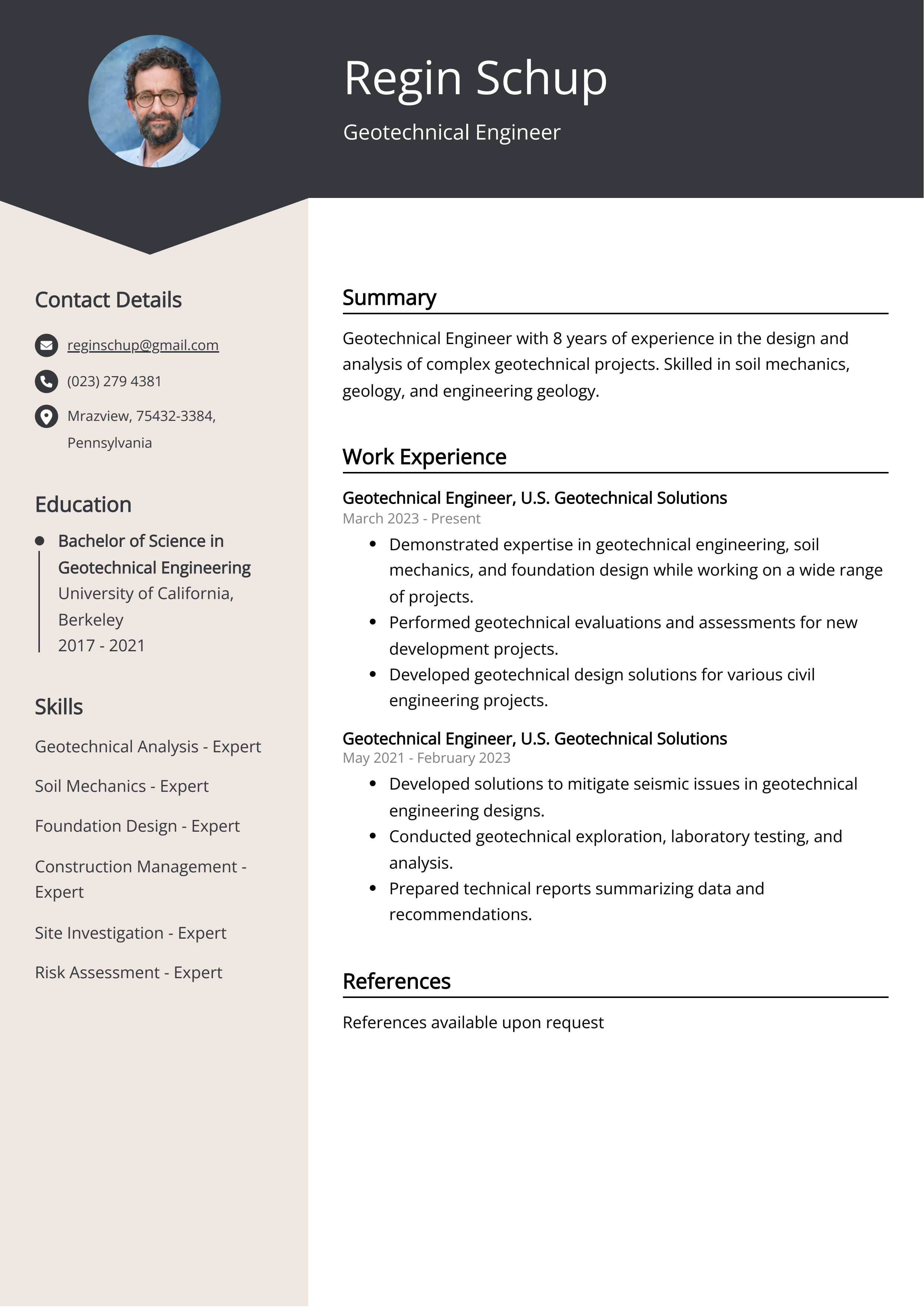The Of Geotheta
The Of Geotheta
Blog Article
The Basic Principles Of Geotheta
Table of ContentsAn Unbiased View of GeothetaThings about GeothetaWhat Does Geotheta Mean?Our Geotheta IdeasSome Known Factual Statements About Geotheta

They conduct site examinations, collect samples, execute research laboratory tests, and analyze data to examine the suitability of the ground for building and construction jobs - Consulting Engineers. Based on their findings, geotechnical designers offer referrals for foundation design, slope stability, keeping frameworks, and mitigation of geotechnical threats. They collaborate with other professionals, such as engineers, architectural designers, and construction groups, to make sure that geotechnical considerations are integrated into the general job layout and application
By evaluating the actions and residential properties of dirt and rock, they can determine prospective geotechnical dangers such as landslides, dirt negotiation, or incline instability. Their proficiency assists stop failings or mishaps that can endanger lives and building. Right here are some thorough duties and duties of a geotechnical engineer: Website Investigation: Geotechnical engineers conduct website examinations to collect information on subsurface problems.
They analyze the data to understand the homes and actions of the dirt and rock, including their toughness, leaks in the structure, compaction attributes, and groundwater problems. Geotechnical Analysis and Design: Geotechnical engineers assess the information gathered throughout site examinations to analyze the stability and suitability of the site for construction jobs. They execute geotechnical computations and modeling to review factors such as birthing ability, settlement, incline stability, side planet stress, and groundwater circulation.
The Ultimate Guide To Geotheta
Foundation Layout: Geotechnical engineers play a vital role in making foundations that can safely sustain the intended structure. They assess the dirt conditions and tons needs to identify the proper structure kind, such as superficial foundations (e.g., grounds), deep foundations (e.g (https://www.slideshare.net/ianhammond2191)., stacks), or specialized techniques like soil enhancement. They consider factors such as settlement limits, bearing capacity, and soil-structure interaction to create optimal structure styles
They review building and construction plans, monitor website activities, and perform area inspections to validate that the design referrals are followed. If unforeseen geotechnical concerns emerge, they examine the scenario and provide suggestions for remediation or modifications to the design. Threat Evaluation and Mitigation: Geotechnical designers evaluate geotechnical hazards and threats related to the project site, such as landslides, liquefaction, or soil disintegration.

Collaboration and Interaction: Geotechnical designers function very closely with various other specialists involved in a project, such as designers, structural designers, and building groups. Effective interaction and collaboration are crucial to incorporate geotechnical factors to consider into the overall task layout and construction process. Geotechnical engineers provide technological knowledge, solution questions, and make sure that geotechnical needs are satisfied.
Some Ideas on Geotheta You Need To Know
Right here are some sorts of geotechnical engineers: Foundation Designer: Foundation designers specialize in creating and examining foundations for structures. They assess the soil conditions, tons needs, and site features to determine one of the most ideal structure type and design, such as superficial structures, deep structures, or specialized methods like heap structures.
They evaluate the aspects affecting incline security, such as soil buildings, groundwater problems, and slope geometry, and develop techniques to stop incline failings and alleviate dangers. Quake Engineer: Earthquake designers focus on assessing and making structures to withstand seismic forces. They analyze the seismic risk of a site, assess dirt liquefaction potential, and create seismic design criteria to make sure the security and strength of frameworks during quakes.
They do area screening, gather samples, and analyze the accumulated data to identify the dirt residential or commercial properties, geologic formations, and groundwater problems at a website. Geotechnical Instrumentation Designer: Geotechnical instrumentation designers concentrate on monitoring and determining the actions of soil, rock, and structures. They set up and keep instrumentation systems that check aspects such as soil negotiation, groundwater levels, slope motions, and structural displacements to evaluate performance and give very early cautions of prospective problems.
Geotheta for Dummies
They conduct tests such as triaxial tests, combination examinations, straight shear tests, and leaks in the structure examinations to gather information for geotechnical analysis and design. Geosynthetics Engineer: Geosynthetics engineers specialize in the style and application of geosynthetic materials, such as geotextiles, geogrids, and geomembranes. They utilize these materials to improve soil stability, strengthen slopes, offer drain options, and control erosion.
They have a tendency to be investigative people, which implies they're intellectual, introspective, and analytical. They wonder, systematic, logical, analytical, and sensible. Some of them are also social, indicating they're kind, charitable, participating, individual, caring, useful, compassionate, skillful, and friendly. Does this seem like you? Take our totally free job examination to discover if geotechnical engineer is one of your top job suits.
In the office setting, geotechnical designers make use of specialized software program tools to perform computations, produce designs, and examine information. They prepare records, testimonial task specifications, connect with clients and employee, and coordinate task tasks. The workplace setting supplies a helpful setting for study, analysis, and cooperation with other specialists involved in the project.
The 10-Minute Rule for Geotheta
They often see task sites to conduct website examinations, examine geotechnical conditions, and gather information for analysis. These brows through involve traveling to various places, occasionally in remote or tough surfaces. Geotechnical engineers might perform soil sampling, conduct examinations, and display building and construction activities to make certain that the geotechnical elements of the project are click now being executed appropriately.
Geotechnical designers also work in specialized geotechnical laboratories. In these facilities, they conduct experiments, do examinations on dirt and rock samples, and evaluate the engineering properties of the products. Geotechnical lab designers function thoroughly in these environments, taking care of screening tools, running instruments, and taping information. They team up with various other laboratory team to make sure precise and dependable screening outcomes.
Report this page